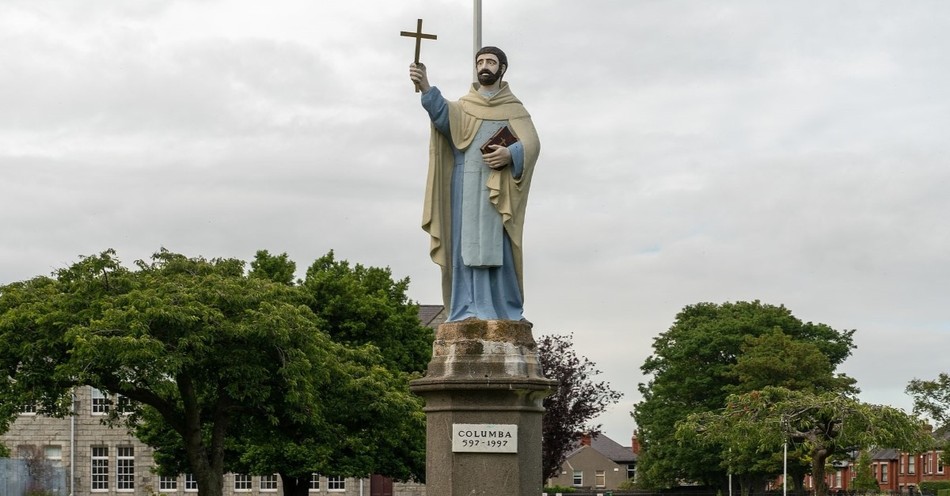Nearly a century after the fall of the Western Roman Empire in 475 AD, various former Roman territories fell into complete disarray as various kingdoms and clans fought over the remains. The English isles were no exception. England, Scotland, and Wales founded and expanded new kingdoms that came (and went) over the centuries. Meanwhile, just over 300 miles across the sea, Ireland remained unconquered by Rome, though trade occurred between them. Here, Christianity would sprout and flourish.
How Did Christianity Come to Ireland?
Before even St. Patrick, Christianity had already arrived in the Celtic lands. How it arrived and spread in the country remains unknown. Various theories have been put forward:
- slave trade ships brought enslaved Christians to Ireland
- trade relations with Gaul or Rome brought Christian influences to Ireland
- the refugee migration after Rome’s fall brought fleeing Christians to Ireland
The full answer remains a mystery. We do know that Christianity flourished in fourth- and fifth-century Ireland, and particular Christians (later canonized as saints) spread it even more. One of these Christians was St. Columba of Iona.
Who Was St. Columba?
Born in 521 AD in Gartan (modern-day Count Donegal, Ireland), Columba of Iona is traditionally known as the Patron Saint of Derry in Northern Ireland. As previously mentioned, parts of Europe fell into chaos and war after Rome fell, with the English isles being one of them. Amid the chaos, Christianity spread and particularly in Ireland. Monks like Patrick played a key role in the faith spreading.
Patrick’s role in spreading Christianity is crucial to understanding Columba’s contributions.
According to Irish legend and some church history, Patrick was kidnapped and enslaved by Irish pirates at age 16. His kidnapper is said to have been the Irish king Niall, Columba’s grandfather. While these two saints would never meet, their stories intertwined in this surprising way. After several years of slavery, Patrick escaped Ireland but returned as a missionary.
Columba was ordained a priest in 551 AD. During his monastic life, he founded a monastery in Derry, Ireland. He remained there, serving God and local communities, for nearly a decade. He departed for Iona, Scotland, in 563 AD. According to the Oxford Dictionary of the Saints, there are various explanations for Columba leaving Derry. According to one source, he voluntarily exiled himself for Christ. Another source suggests he sought to help Christian missionaries struggling to spread the Gospel overseas. A third source claims he was exiled as punishment for being involved in a conflict between monasteries over a copy of a Psalm that he made but refused to turn over. Whatever the reason, Columba set a course for Scotland with 12 of his disciples.
During Columba’s ministry in Scotland, specifically the Western Islands, he founded two churches and converted many to Christianity. According to church history, his converts included Brude, king of the Picts, and Aidan, the Irish king of Dalriada, both in 579 AD. He would continue transcribing the books of the Bible and more until he died in 597 AD. After multiple Viking raids on Iona in the ninth century, his relics were transferred to Dunkeld, Scotland.
Who Were St. Columba’s Contemporaries in Ireland?
While Patrick was not solely responsible for Christianity’s spread into Ireland, his role was significant. He is considered one of Celtic Christianity’s three pillars. His work paved the way for other Christian missionaries, including Columba. In his lifetime, Patrick converted countless pagans to the faith and has beautiful prayers attributed to him. Thomas Cahill discusses more of Patrick’s contributions and spiritual descendants in How the Irish Saved Civilization.
Columba was another pillar, and the third was St. Brigid. Born around the same time as Columba, Brigid was a bard (poet) who founded Ireland’s first nunnery (which became a community for both monks and nuns over time). She is credited with various miracles and other works. Like Columba and Patrick, there is undisputed history, then there are various legends that Christians continue to debate and discuss.
These three would set the stage for the faith to grow outside Ireland, into the British Isles, and on to Northern Europe. Their work inspired many sixth-century saints (such as St. Aidan and St. Gall) to follow their example.
Why Do We Remember St. Columba?
Iona’s fame due to Columba resulted in countless conversions of English and Scottish pagans. Word spread throughout Europe of Iona’s reputation for its ministry and education. Eventually, it was to become a place of pilgrimage and remained so for the next few centuries.
Aside from his missionary work with the pagan rulers, Columba is also known as a bard or poet. According to the Oxford Dictionary of Saints, He is credited with preserving his order, assuring the continued presence of laity education among the Irish. Unfortunately, none of his work remained except for a sixth-century insular psalter, the Cathach of Columba. To this day, it is one of the oldest surviving manuscripts in Ireland and can still be seen to this day. Many Christians over the centuries would take pilgrimages to see and venerate Columba’s writings. Even soldiers and rulers from battle would pay visits to see his work to be reminded of his dedication to the faith in Ireland and Scotland.
Furthermore, Irish author and evangelist Adamnan wrote an extensive record on Columba. His record includes a detailed description of his gift of prophecy and various miracles. For example, during Columba’s time as a deacon in the monastery, wine was unavailable for the priest during the Mass. Colbuma took spring water used for the Eucharist. He brought it before the clergy at the altar and said, “Here is wine, which the Lord Jesus hath sent for the celebration of His mysteries.” At that moment, the water turned to wine, astonishing the clergy.
More can miracles and mysteries by Columba can be found in Admnan’s records.
Inspiring Quotes by St. Columba
Many saints left behind profound wisdom that can strengthen others’ faith. Columba is no exception. His personal and attributed quotes include the following:
1. “Be alone in a separate place near a chief city, if thy conscience is not prepared to be in common with the crowd.”
2. “Alone with none but thee, my God,
I journey on my way.
What need I fear when thou art near,
Oh, king of night and day?
More safe am I within thy hand,
Than if a host did round me stand.”
3. “Be, Lord Jesus, a bright
Flame before me,
A guiding star above me,
A smooth path below me,
A kindly shepherd,
Behind me:
Today, tonight, and forever.”
4. “Be naked in imitation of Christ and the Evangelists.”
5. “Constant prayers for those who trouble thee.”
6. “Three labors in the day: prayers, work, and reading.”
7. “Every increase which comes to thee in lawful meals, or in wearing apparel, give it for pity to the brethren that want it, or the poor in like manner.”
8. “Abide in the Testament of God throughout all times.”
Photo Credit: William Murphy/Wikimedia Commons

This article is part of our People of Christianity catalog that features the stories, meaning, and significance of well-known people from the Bible and history. Here are some of the most popular articles for knowing important figures in Christianity:
How Did the Apostle Paul Die?
Who are the Nicolaitans in Revelation?
Who Was Deborah in the Bible?
Who Was Moses in the Bible?
King Solomon's Story in the Bible
Who Was Lot's Wife in the Bible?
Who Was Jezebel in the Bible?
Who Was the Prodigal Son?



.jpg)
